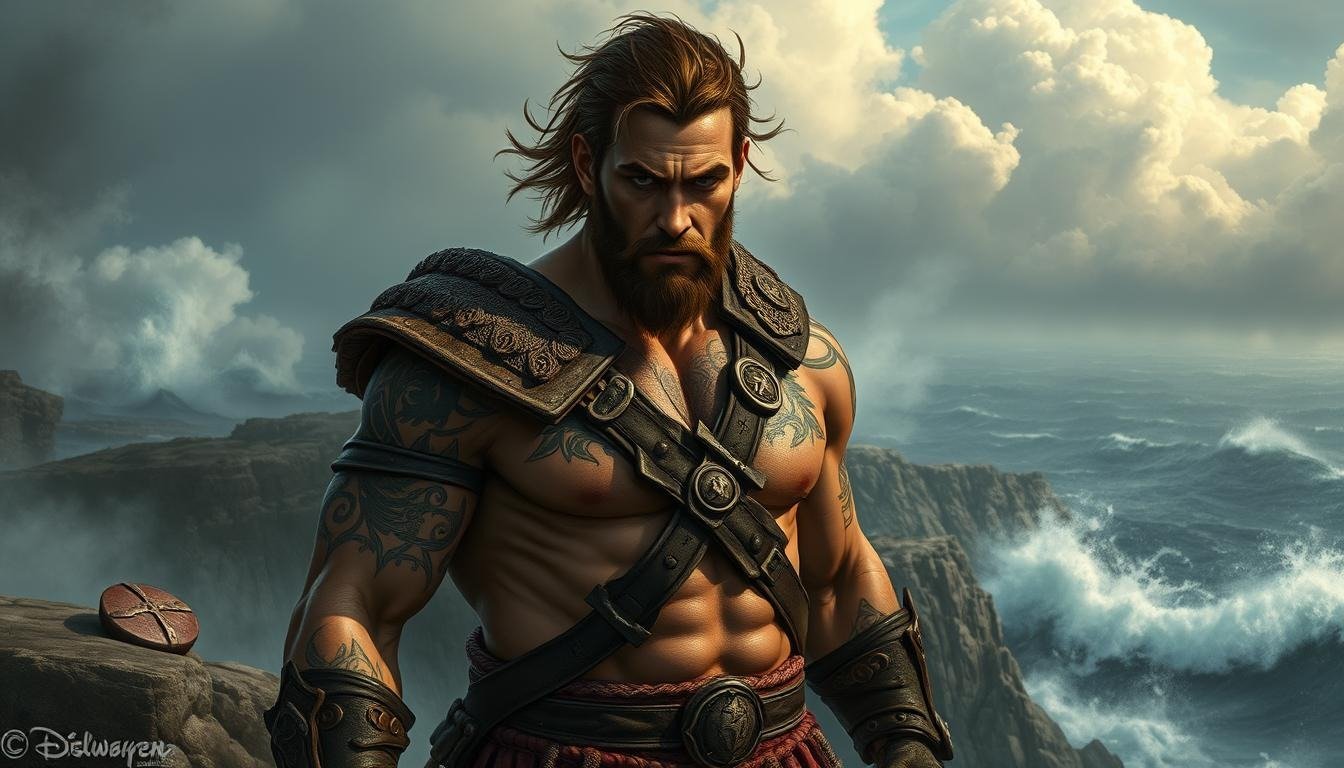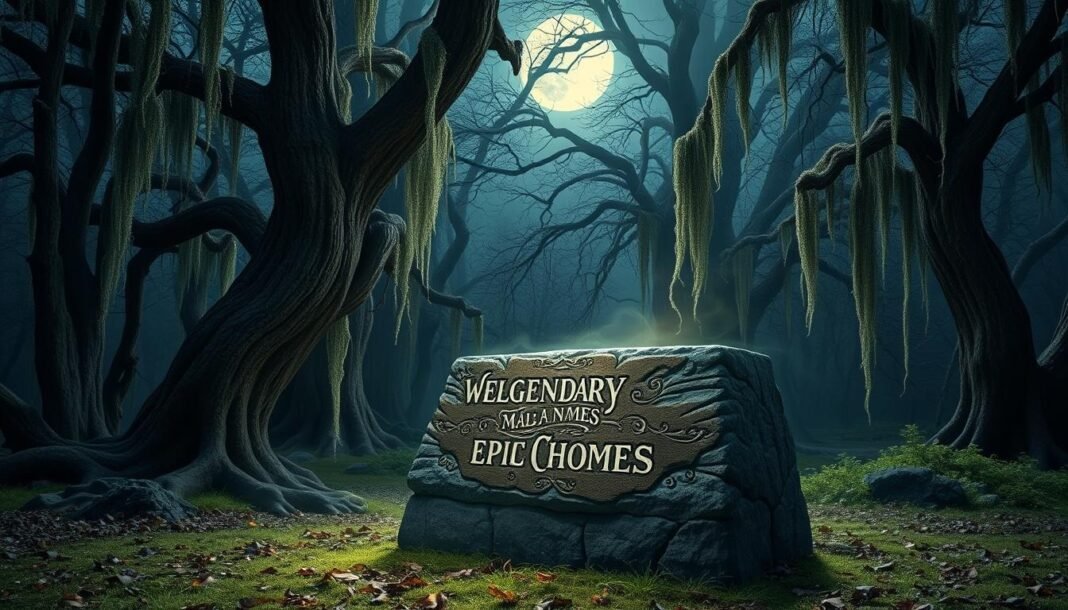Names shape how readers see characters in fantasy stories. Choosing the right fantasy male names brings your epic tales to life.
We’ll look at different character naming options for your epic fantasy adventure. Each name can give your hero a unique personality.
A mystical forest clearing under moonlight featuring a weathered stone pedestal adorned with intricate carvings of legendary male names from epic fantasy. Ethereal wisps of light swirl around the pedestal, illuminating the names while ancient trees loom in the background, their branches draped with shimmering vines.
The right name can make your character unforgettable. It works for warriors, sorcerers, or complex antiheroes.
Let’s explore fantasy male names to find the perfect fit. Your next character will stand out and captivate readers.
Introduction to Fantasy Male Names
Fantasy character names hold great power in literature. They can reveal traits, cultures, and crucial story elements.
Well-chosen names shape how readers see and feel about characters. They can make readers care more about the story.
J.R.R. Tolkien created excellent names for Middle-earth. Aragorn, Gandalf, and Legolas sound heroic, wise, and graceful.
George R.R. Martin’s A Song of Ice and Fire has excellent names, too. Jon Snow, Daenerys Targaryen, and Tyrion Lannister tell us about their families.
Good fantasy character naming is more than just unique sounds. It should match the character’s development and importance in the story.
Authors can make stories more exciting by picking names with special meanings. This helps readers feel more connected to the story.
When writing fantasy, remember how powerful names can be. Choose names that show who your characters really are.
Good names can help make your story more exciting for readers. They can be a key part of your story’s magic.
Classic Fantasy Male Names to Consider
Classic fantasy books offer a wealth of iconic male character names. These names have inspired many authors and storytellers over the years.
J.R.R. Tolkien and C.S. Lewis created beloved worlds filled with memorable names. Their characters continue to captivate readers of all ages.
Aragorn is a famous name from Tolkien’s “The Lord of the Rings” trilogy. It represents strength, leadership, and destiny in the fantasy genre.
Aslan, the mighty lion from Lewis’s “The Chronicles of Narnia,” is another well-known name. It symbolizes courage, wisdom, and divine power.
Jon Snow is a key character in George R.R. Martin’s “A Song of Ice and Fire” series. His name hints at his mysterious background and essential role.
These classic fantasy names have become beloved by readers worldwide. They continue to inspire new generations of fantasy writers and fans.
Unique and Uncommon Fantasy Names
Fantasy names can make characters truly special. Lesser-known myths and folklore offer a treasure trove of unique ideas.
These rich cultural sources give fantasy creations a fresh, distinctive flair. They set characters apart from the ordinary.
Slavic mythology offers names like “Zmaj,” a dragon-like creature. “Rusalka,” a water nymph, is another example.
Ancient Mesopotamian lore gives us “Gilgamesh” and “Inanna”. Native American traditions offer “Tala” and “Matoaka.”
Crafting unique names is an art. Try different sound combinations and play with rhythm.
Blend elements from various cultures. This brings life to names that captivate readers.
Alliterative Names for a Catchy Sound
Alliterative names pack a punch in epic fantasy. They create memorable characters that stick with readers for years.
Think of Aragorn from “The Lord of the Rings”. Or Ser Barristan Selmy from “A Song of Ice and Fire.”
Alliterative names can make your fantasy world more exciting. They grab readers’ attention and spark their imagination.
These names add rhythm to your story. This makes the reading experience more fun and immersive.
Try using alliterative names in your writing. You’ll see how they can bring your characters to life.
Names Based on Cultural Inspirations
Fantasy names often draw from our world’s rich cultural tapestry. This adds depth and authenticity to fantasy realms.
Writers can explore naming conventions from global traditions. This expands the range of culturally inspired names.
Names like Akiko, Keshav, or Ixchel evoke distinct cultural identities. These add complexity and diversity to the fantasy genre.
Writers should use culturally inspired names with respect. It’s important to avoid cultural appropriation.
Diverse fantasy names create more prosperous, more inclusive worlds. These resonate with readers from all backgrounds.
This approach enhances artistic expression. It also fosters an appreciation for cultural sensitivity in storytelling.
Fantasy Names with Strong Meanings
Epic fantasy character names hold deep meaning. They reveal the depth of protagonists, antagonists, and supporting cast.
Names with rich symbolism give characters purpose and history. This creates a stronger connection with readers.
Aragorn means “noble-man” in Sindarin elvish. It shows his claim to Gondor’s throne and role as savior.
Daenerys Targaryen reflects her dragon heritage. It also hints at her destiny to reclaim the Iron Throne.
Name symbolism helps create fully realized characters. This deepens readers’ emotional investment in the story.
Consider the deeper meaning behind your character’s name. Meaningful names can elevate your storytelling and create memorable characters.
Names for Different Fantasy Settings
The setting shapes character names in fantasy stories. Medieval fantasy names draw from Old English, Norse, or Celtic influences.
Names like Aelfric, Thorvald, or Aisling mirror rugged landscapes. They evoke a sense of tradition and heritage.
Sci-fi and futuristic fantasy need a different approach. These names have a modern, streamlined feel.
Zara, Kiran, or Corbin sound sleek and intriguing. They transport readers to far-off galaxies.
Choose names that fit your created world. The correct name brings characters to life.
It immerses readers in your unique setting-specific names, medieval fantasy, or sci-fi fantasy.

Character Traits Reflected in Names
Fantasy character names can reveal personality and narrative roles. Iconic names often hint at a character’s personality or destiny.
Aragorn’s firm name suggests leadership and nobility. Daenerys Targaryen’s name evokes power and regal bearing.
Names can be a powerful storytelling tool. Bilbo Baggins sounds whimsical, while Voldemort seems ominous.
Names help readers form initial impressions about characters. These impressions can be changed or strengthened as the story unfolds.
A brooding, muscular warrior with intricate tattoos symbolizing strength and honor, clad in weathered armor adorned with mystical runes, standing on a windswept cliff overlooking a stormy sea, his piercing gaze revealing resilience and determination, surrounded by dramatic clouds and crashing waves.
Well-chosen names create a more immersive reading experience. This is especially true in fantasy, where characters often become legendary.
Mastering name selection helps authors craft memorable characters. These characters can stay with readers long after the story ends.
Conclusion: Finding the Perfect Name
Choosing a fantasy male name can be exciting and challenging. The name reflects your character’s essence and brings them to life.
Trust your creative instincts and try different naming techniques. Mix influences and play with sounds. Consider the deeper meanings behind each name.
The correct name will feel perfect for your character. Dive into the process and enjoy creating unique names.
A great name can transport readers to new worlds. It can introduce them to unforgettable characters.
Mastering fantasy name selection opens up storytelling possibilities. It helps create characters that stay with readers long after finishing.
FAQ
What makes a great fantasy male name?
A great fantasy male name should be memorable and evocative. It should match the character’s personality and the fantasy world.
The name should be easy to say and spell. It should also hint at mystery, power, or uniqueness.
How can I find inspiration for fantasy male names?
Look to mythology, literature, languages, and cultural traditions for ideas. Try mixing word roots, prefixes, and suffixes to make original names.
What are some classic examples of fantasy male names?
Aragorn from “The Lord of the Rings” is a classic fantasy name. Rand al’Thor from “The Wheel of Time” is another good example.
Visitors from “A Song of Ice and Fire” are also well-known.
How can I make my fantasy male names more unique?
Use lesser-known myths or mix elements from different languages. Try unusual letter combinations or alliterative names for a unique touch.
What are some tips for choosing the right fantasy male name for my character?
Think about the character’s personality, culture, and role in the story. Pick a name that’s easy to remember but still mysterious.
You may also read : 2020 Angel Number: Messages from Your Spirit Guides
